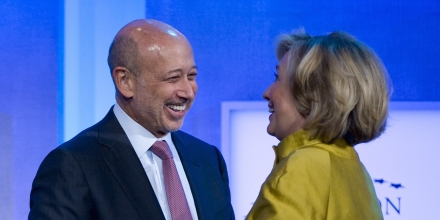 The Wall Street Journal recently reported: “Both of the leading Democratic presidential candidates made the case [during the last debate] that the financial services industry wants to keep them out of the White House, fearing the tough regulatory measures they would impose if elected.” Vox reports: “According to [Bernie] Sanders, a bank that is too big to fail is too big to exist … Sanders has gone beyond offering dream legislation to suggest that if he is elected president he will achieve a bank breakup within one year, whether Congress likes it or not.” And Lee Fang of The Intercept reports January 23: “After Hillary Clinton spoke at a town hall in Manchester, New Hampshire, on Friday, I asked her if she would release the transcripts of her paid speeches to Goldman Sachs. She laughed and turned away.” See video and RootsAction DIY alert urging release of Clinton’s speeches to Goldman Sachs.
The Wall Street Journal recently reported: “Both of the leading Democratic presidential candidates made the case [during the last debate] that the financial services industry wants to keep them out of the White House, fearing the tough regulatory measures they would impose if elected.” Vox reports: “According to [Bernie] Sanders, a bank that is too big to fail is too big to exist … Sanders has gone beyond offering dream legislation to suggest that if he is elected president he will achieve a bank breakup within one year, whether Congress likes it or not.” And Lee Fang of The Intercept reports January 23: “After Hillary Clinton spoke at a town hall in Manchester, New Hampshire, on Friday, I asked her if she would release the transcripts of her paid speeches to Goldman Sachs. She laughed and turned away.” See video and RootsAction DIY alert urging release of Clinton’s speeches to Goldman Sachs.
Meanwhile, in Santa Fe, New Mexico, according to the Santa Fe New Mexican‘s Bruce Krasnow on January 13: “A feasibility study released Wednesday concluded that the city of Santa Fe could save money by establishing a public bank.” The feasibility study states: “The projected fiscal and economic impact to the City exceeds $24 million in the first seven years, based upon assumptions of how much of the City’s deposits are deployed in self-funding and reduced collateral programs.”
ELLEN BROWN, ellenhbrown at gmail.com
Founder of the Public Banking Institute, Brown is the author of Web of Debt and The Public Bank Solution. She recently appeared on The Real News: “Can Clinton Be Trusted to Regulate the Industry That Made Her Wealthy?”
She said today: “The hazards posed to the economy and our savings by risky Wall Street banks have become a major campaign issue in the presidential debates. Some say the problem can be solved with more regulation. But we already tried that with Dodd-Frank, currently the most complicated bill ever passed by Congress — and it hasn’t solved the problem. Dodd-Frank replaces bailouts with ‘bail-ins’ — depositors will be at least partly liable for keeping too-big-to-fail banks afloat. And the massive tangle of new regulations has hamstrung smaller community banks that loan to small businesses, creating jobs. What will replace the banks if we break them up? Publicly-owned depository banks modeled after the Bank of North Dakota can serve that purpose, and partner with community banks to direct credit where it’s needed locally, reduce the costs of government, and eliminate outlandish Wall Street fees and the need for derivatives to mitigate risk.” The Public Banking Institute notes that in addition to recent moves in New Mexico, the Philadelphia City Council passed a resolution last week authorizing hearings on public banking.